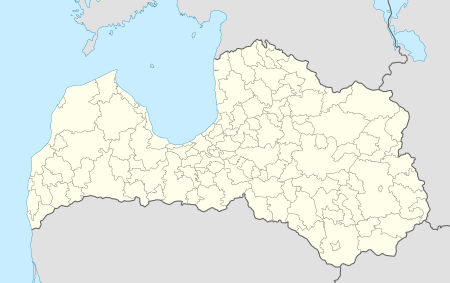Mazsalaca
| Mazsalaca | ||
|---|---|---|
| Town | ||
|
Street in Mazsalaca | ||
| ||
 Mazsalaca Location in Latvia | ||
| Coordinates: 57°52′N 25°03′E / 57.867°N 25.050°ECoordinates: 57°52′N 25°03′E / 57.867°N 25.050°E | ||
| Country |
| |
| District | Mazsalaca municipality | |
| Town rights | 1928 | |
| Population | ||
| • Total | 1,269 | |
| Time zone | UTC+2 (EET) | |
| • Summer (DST) | UTC+3 (EEST) | |
| Postal code | LV-4215 | |
| Calling code | +371 642 | |
| Number of city council members | 9 | |
Mazsalaca (pronounced [ˈmɑsːɑlɑtsɑ] (![]()
Geography
The area includes the largest known Stone Age burial site in Northern Europe and was first settled ca. 5000 BC. The present town began to develop in 1864, when a bridge over the Salaca river was constructed.
In October 2009 a meteorite crater was found near the town,[1] which later turned out to be hoax as part of marketing campaign of telecommunication company Tele2.[2]
People
People who were born, lived in Mazsalaca:
- Gustavs Ērenpreiss (1891 - 1956) - bicycle master
- Augusts Kirhenšteins (1876 - 1963) - microbiologist and educator
- Valters Hirte (1913 - 1983) - craftsman
- Ansis Epners (1937 - 2003) - film director
- Oskars Perro (1918 - 2003) - soldier and writer
See also
References
- ↑ "Europe | Doubts over Latvia 'meteor crash'". BBC News. 2009-10-26. Retrieved 2012-03-15.
- ↑ Nina Kolyako, BC, Riga, 26.10.2009.Print version (2009-10-26). ""Mazsalaca meteorite" in Latvia – marketing hoax by Tele2 :: The Baltic Course | Baltic States news & analytics". The Baltic Course. Retrieved 2012-03-15.
External links
- Mazsalaca Municipality portal

This article is issued from
Wikipedia.
The text is licensed under Creative Commons - Attribution - Sharealike.
Additional terms may apply for the media files.
